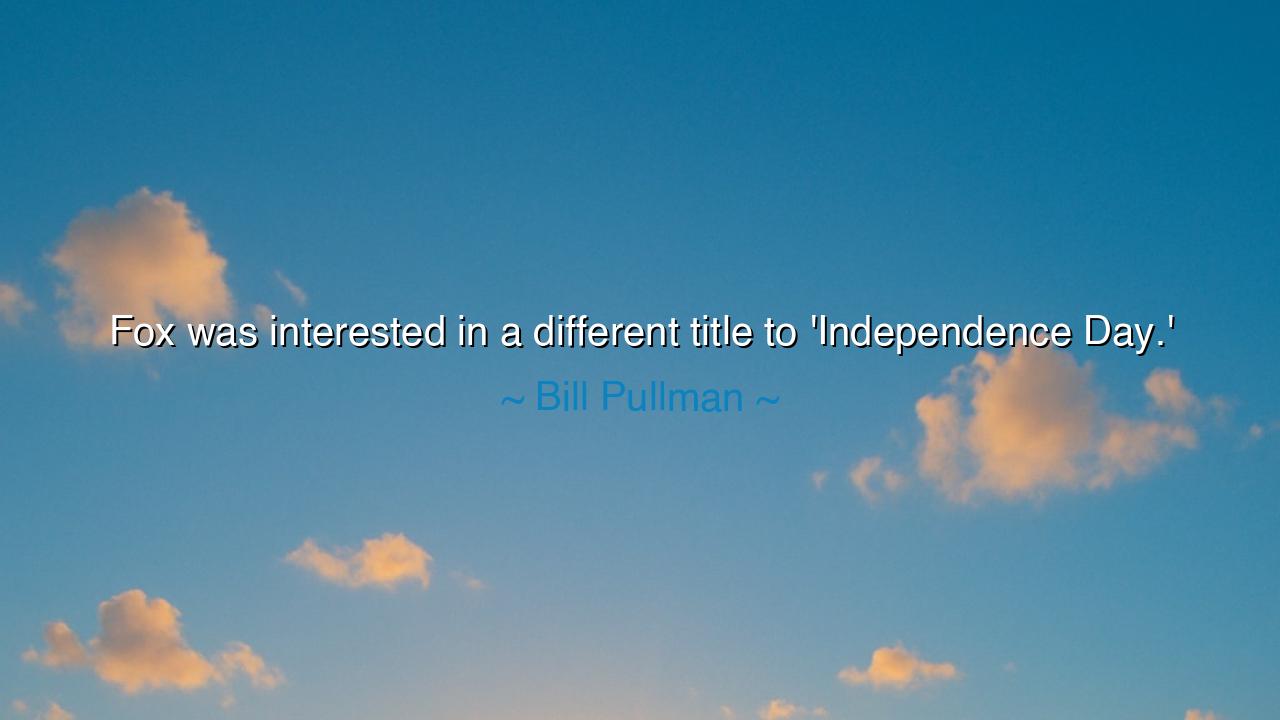
Fox was interested in a different title to 'Independence Day.'






“Fox was interested in a different title to ‘Independence Day.’” Thus spoke Bill Pullman, the actor who, in the grand tapestry of cinema, became forever known as the voice of defiance and unity — the President who rallied humanity in the face of annihilation. Though at first glance his words seem light, mere recollection of a studio’s preference, within them lies a deeper reflection on the struggle between commerce and vision, between creative spirit and the machinery of industry. It is a tale as old as art itself: the eternal contest between those who dream and those who measure dreams by profit.
To understand the meaning of this quote, we must return to the birth of the film itself — “Independence Day” (1996), that modern epic of invasion and deliverance. The film’s creators, Roland Emmerich and Dean Devlin, envisioned more than spectacle. They sought to craft a story that spoke to the human yearning for unity, courage, and renewal. The title “Independence Day” was not chosen for its market value, but for its symbolism — the liberation of Earth from destruction, mirroring America’s own birth of freedom. Yet, as Pullman recalls, the studio Fox had its doubts. They wanted another name, something more conventional, something that fit neatly within their vision of success. Thus, before the first explosion or stirring speech was filmed, a quiet battle for the soul of the story had already begun.
This moment, though small in appearance, reflects a great truth about the world of creation. The artist dreams in symbols; the merchant dreams in numbers. The artist looks upon the stars and asks, “What does this mean?” while the merchant asks, “What will it earn?” Yet throughout history, it has always been the dreamers — those who defend the purity of their vision — who have shaped the hearts of generations. Emmerich and Devlin refused to yield, insisting that the title “Independence Day” was not just a name, but the essence of their film. When the climactic speech — spoken by Pullman’s character — declared July Fourth as humanity’s new day of freedom, the meaning became undeniable. Art had triumphed over compromise.
The ancients knew this struggle well. When Michelangelo painted the ceiling of the Sistine Chapel, his patrons pressed him to hurry, to simplify, to serve their agenda. But he labored on, guided not by instruction but by conviction. What they sought was decoration; what he created was revelation. So too in the making of “Independence Day,” the visionaries behind it understood that names carry power. A title is more than a label — it is the spirit that binds the creation. Just as Rome was not merely a city but an idea, so too was “Independence Day” not merely a film about aliens, but a declaration of humanity’s courage against the impossible.
And when the film finally reached the world, its name became legend. Audiences did not remember it as a tale of destruction, but of rebirth. The title resonated because it spoke to something timeless — the yearning to stand free, to rise from despair, to claim ownership of one’s destiny. Thus, Pullman’s recollection is more than trivia; it is a parable. It reminds us that even the smallest details — a title, a phrase, a word — can hold the soul of a creation. Had the artists yielded, the film might still have entertained, but it would not have inspired. It was the act of resistance — the refusal to surrender meaning to convenience — that made it eternal.
History, too, bears witness to such moments. When Thomas Jefferson penned the Declaration of Independence, he too faced doubts, edits, compromises. Many sought to soften his words, to temper their defiance. Yet he held firm, and from that firmness was born a nation. The power of a title — Independence — has echoed for centuries, shaping revolutions and hearts alike. And so, in the modern retelling of that spirit, “Independence Day” became not only a film, but a mirror reflecting humanity’s oldest struggle: to define itself in its own words, to name its destiny.
So, my child of imagination and truth, let this be your lesson: guard the name of your vision. When you create, when you dream, when you labor to bring something forth into the world, there will always be voices urging you to change, to compromise, to fit your fire into their mold. But remember that every great work — every act of independence — begins with a soul that refuses to bow. A name, a principle, a belief — these are not small things. They are the banners under which the spirit marches toward immortality.
Thus, as Bill Pullman’s words remind us, even a movie title can hold the weight of a revolution. For the essence of “Independence Day” — both the film and the ideal — lies in the courage to stand one’s ground. Whether in art, in life, or in the heart’s quiet battles, let your creations bear the name they deserve. Do not trade meaning for ease. For the world remembers not those who followed the market, but those who followed the call of their own freedom — and made it their independence.






AAdministratorAdministrator
Welcome, honored guests. Please leave a comment, we will respond soon